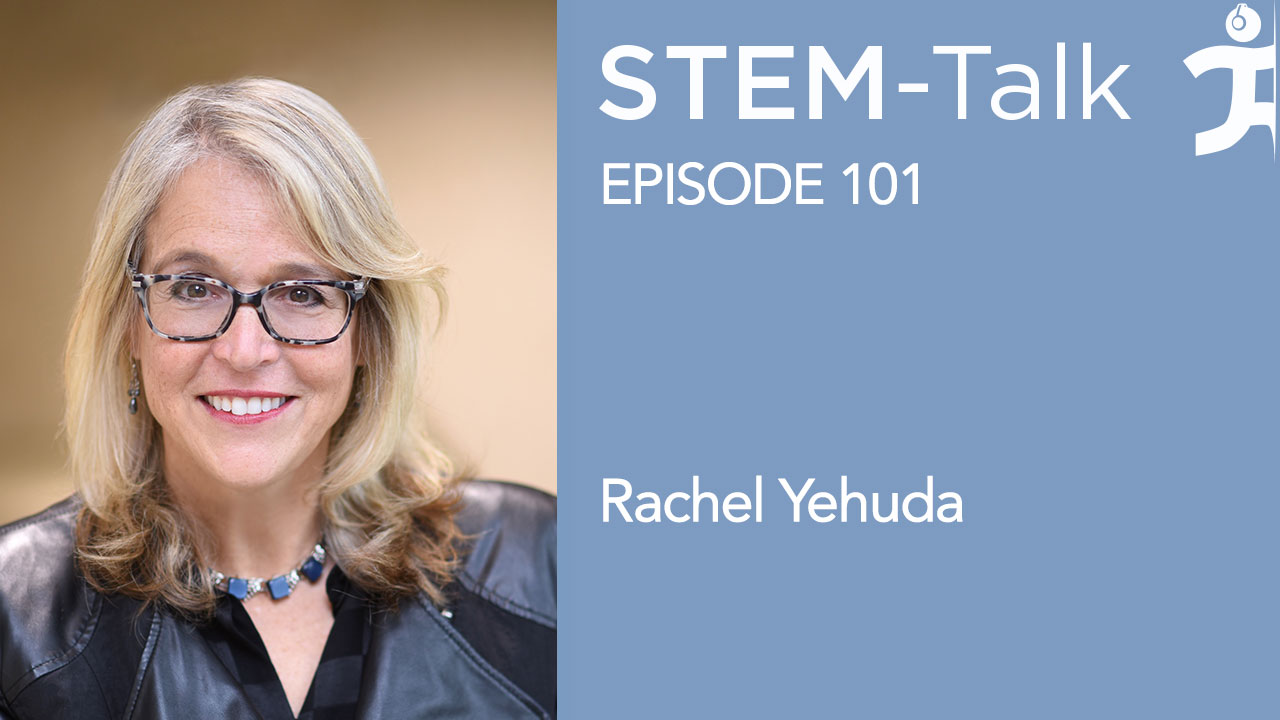STEM-Talk
Episode 101: Rachel Yehuda talks about epigenetic inheritance, PTSD and the potential of MDMA therapies
// Jan 7, 2020

Today we talk with Dr. Rachel Yehuda whose pioneering research on cortisol and brain function has revolutionized worldwide our understanding and treatment of post-traumatic stress disorder.
Rachel is also well-known for her studies on the intergenerational transmission of trauma and PTSD. This novel research has shown that the children of traumatized parents are at risk of similar problems due to epigenetic changes that are transmitted from the parents to their offspring. She has worked with war veterans, Holocaust survivors and other victims of trauma to detail the biological roots of PTSD.
She is a professor of psychiatry and neuroscience and the director of the Traumatic Stress Studies Division at the Mount Sinai School of Medicine in New York City. She also is the director of the Mental Health Patient Care Center at the James J. Peters VA Medical Center.
Show notes:
[00:02:31] Dawn begins the interview asking Rachel about her time as a child growing up in Cleveland. [00:03:17] After Ken mentions that Rachel’s father was a rabbi, Rachel explains how growing up in an observant Jewish household shaped her. [00:04:46] Rachel talks about a biology teacher who inspired her to go beyond her interests in philosophy and pursue science. [00:05:50] Dawn asks Rachel why it seems that so many scientists start out with an interest in philosophy. [00:07:16] Dawn asks Rachel why she decided to major in psychology at Touro University in New York. [00:08:16] Ken asks Rachel why she decided to attend the University of Massachusetts at Amherst after graduating from Touro University. [00:09:03] Rachel explains how she went into graduate school looking for a way to become both a psychologist and a scientist. [00:10:08] Dawn asks Rachel about something Rachel’s daughter observed about her: “You move to the beat of your own drum. You never do anything other than what the voice in your head tells you to do.” [00:11:12] Ken asks if it is true that Rachel’s first graduate advisor was not optimistic about Rachel making it through grad school. [00:12:33] Rachel tells the story of how she first met Bill Edell and walked up to him and said that she wanted to do clinical research. [00:14:38] Ken asks Rachel why she decided to do research on stress, particularly when stress wasn’t a major focus of research in the 1980s. [00:16:05] Dawn mentions that after graduating from UMass Amherst, Rachel did her postdoctoral work in biological psychiatry at Yale Medical School. Rachel met Dr. Earl Giller there, who became Rachel’s mentor and an early researcher in post-traumatic stress disorder. Rachel talks about how Dr. Giller had just completed a study on Vietnam veterans showing low cortisol levels. [00:18:40] Rachel talks about how for her post-doc at Yale she wanted to look into the biology of personality, but was told that it was a “dumb idea” for post-doc research. [00:22:06] Dawn asks about the paradox uncovered by Dr. Giller’s research into Vietnam veterans showing low cortisol levels when stress is supposed to be associated with elevated cortisol levels. Dawn goes on to ask how this finding led Rachel to interview Holocaust survivors in her hometown of Cleveland. [00:24:43] Rachel tells the story of when she talked to a group of Holocaust survivors, a woman came up to her and said: You know, Dr. Yehuda, we don’t have VA centers like your veterans do. [00:26:20] Ken asks about the program Rachel set up to help Holocaust survivors. [00:27:20] Dawn points out that in 2016 Rachel published the results of a study looking at the genes of 32 Jewish women and men. She and her colleagues at Mount Sinai studied Holocaust survivors who either had been interned in Nazi concentration camps during World War II or had witnessed or experienced torture. Rachel also looked at the genes of 22 children who were born to the Holocaust survivors after the war. Rachel discusses how the changes in the DNA of Holocaust survivors were in a way passed down to their offspring. [00:29:13] Rachel discusses the necessary caution we should take regarding our understanding of mechanisms and how effects get from one place to another, or from the experience of one generation into the biology of the next, because we simply don’t have sufficient human studies that can truly pinpoint what truly causes the effects we see. [00:32:06] Ken asks about Rachel’s realization that past effects could transform not only the narrative of a person’s life but also their physiology. [00:33:59] Dawn describes Rachel’s 2005 study with woman who were pregnant in the World Trade Center during 9/11, which showed, along with other studies, that children of traumatized parents are at risk of having similar problems as their parents due to changes occurring in the biology of the parents as a result of trauma exposure. Dawns asks about the process of epigenetic changes being transmitted to offspring, which has become known as “intergenerational transmission.” [00:36:27] Ken asks if cortisol is uniformly low, or if there is substantial variation from person to person, since one often hears of elevated cortisol levels in first responders and military populations. [00:38:43] Ken asks Rachel how she ended up at Icahn School of Medicine at Mount Sinai. [00:39:40] Ken asks about Rachel’s role as the founder and director of the Division of Traumatic Stress Studies at Mount Sinai. [00:41:20] Dawn asks Rachel to describe what happens inside a person’s body when they find themselves in a stressful situation. [00:42:47] Dawn mentions that in psychiatry and mental health, symptoms of trauma are treated as psychological, but that Rachel is finding that these problems of trauma also correlate to people having physical problems. [00:44:02] Rachel talks about her role as the Director of the Mental Health Patient Care Center at James J. Peters Veterans Affairs Medical Center in the Bronx, which she has inhabited since 2009. [00:44:58] Rachel is asked to talk about how there are only a few approved pharmacological treatments for PTSD, and no approved medications to enhance resilience. [00:46:38] Ken asks about a study Rachel published in 2013 which indicated that effective psychotherapy can be thought of as a form of “environmental regulation” which is able alter a person’s epigenetic state. [00:49:36] Ken asks how Rachel thinks the discovery of the epigenetic inheritance of trauma could change the way we approach and treat chronic health conditions, and if it is possible that much of what we are experiencing in terms of physical and mental illness as a society at large could be manifestations of trauma that has been caused by changes to epigenetic memory. [00:51:09] Rachel describes her excitement about MDMA-assisted psychotherapy for PTSD, an interest she is collaborating on with Dr. Dave Rabin, who was interviewed on STEM-Talk episode 99. [00:52:14] Dawn refers the MDMA study that Rachel and others are collaborating on with Dave, and how this study has started its phase III trial with the FDA. Rachel gives an overview of what is going on with this study and how MDMA could be licensed and become a medicine. [00:56:09] Ken asks Rachel about her quote where she said in an interview, “My career has been enhanced by the fact that early on nobody believed in PTSD. Well, now, I almost think we’ve been a victim of our own success in many ways because I think we’ve ended up really pathologizing it to a large extent.” [00:58:37] Ken comments on how he relates to Rachel, in that his early career saw him also studying something believed to be impossible, AI, and that things have now been reversed and the power of AI is often overestimated. [00:59:45] Rachel explains that she is thankful to have become a scientist, even though she enjoyed philosophy in her youth, but that if she could no longer be a scientist for some reason, she would want to become a musician. [01:00:15] “Dawn mentions that Rachel has some experience appearing on stage as a singer, such as when she performed at the Meeting of the International Society of Psychoneuroendocrinology with colleagues Thomas Neylan and David Spiegel (interviewed on STEM-Talk episode 45). The song Rachel sang was titled “The Grant Song,” Dawn closes the interview asking Rachel if she wrote the humorous lyrics.






